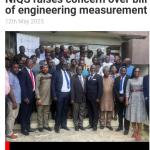Lagos, Nigeria – The Nigerian Institute of Quantity Surveyors (NIQS) has sounded the alarm over what it describes as the misuse of the Building Engineering Measurement and Evaluation (BEME) document, claiming it is being exploited to facilitate corruption in construction projects across Nigeria.
The concerns were raised during a 3-day Engineering Workshop held in Lagos, themed “Bridging Competence Gaps in Engineering Construction: Strategies for Cost and Risk Optimisation in the Oil and Gas Sector.”
Chairman of the NIQS Lagos Chapter, Rilwan Balogun, voiced strong criticism of BEME, stating that the document—widely used in place of the globally recognised Bill of Quantities (BoQ)—lacks transparency and accountability.
“This hijack by engineers has caused a lot of problems,” Balogun said. “Globally, the recognised document is the Bill of Quantities, not BEME. In fact, it is only in Nigeria that BEME is being used and considered a standard, even though it’s not.”
He explained that BEME documents often list cost items simply as “lots,” a vague classification that obscures cost breakdowns and enables inflated valuations. “You see a project valued at N10 billion or N20 billion without any detailed breakdown,” he said. “BEME is essentially a tool for corruption.”
According to Balogun, quantity surveyors provide detailed, itemised cost assessments—from substructure to finishing—ensuring clarity and accountability. “But they know that once quantity surveyors come in, their scheme collapses,” he said. “You can’t be quoting ‘lots’ for measurable items.”
He added that BoQs use provisional sums for uncertain quantities, which are later adjusted based on actual site measurements—sometimes resulting in cost savings for the client. “In contrast, once BEME is signed, there's no accountability for unused funds,” he warned.
Supporting the claims, NIQS Public Relations Secretary John Agbezin noted that the exclusion of quantity surveyors from key stages of construction has significantly hurt project delivery across sectors.
“Engineers have been hijacking roles that rightly belong to quantity surveyors,” Agbezin said. “This has led to mismanaged projects, rampant corruption, and numerous abandoned sites.”
He stressed that BoQs ensure transparency by offering detailed cost breakdowns, in contrast to BEME’s lump-sum approach. “With a Bill of Quantities, you know exactly what each element costs and how rates are applied,” he said. “This brings clarity and helps weed out inefficiencies in project execution.”
The NIQS is urging both government and private sector stakeholders to adopt international best practices by reinstating the BoQ as the standard document for cost planning and control in Nigeria’s construction industry.
Would you like this rewritten for a different type of outlet, like an investigative magazine or technical journal?












